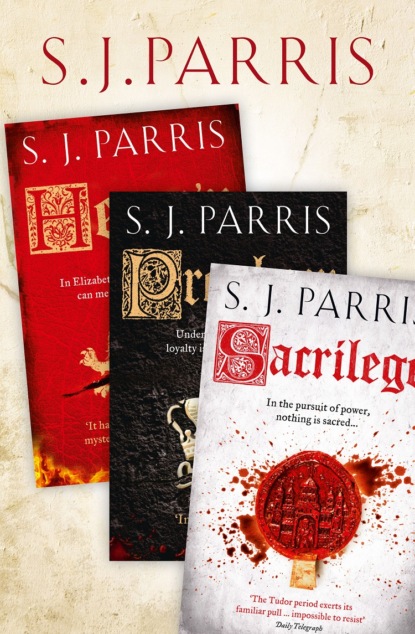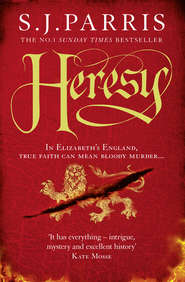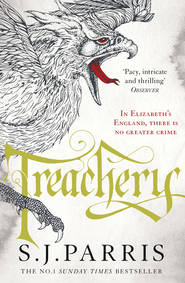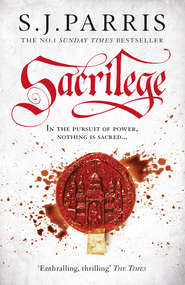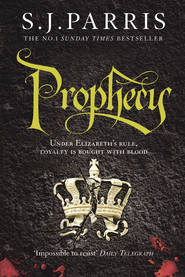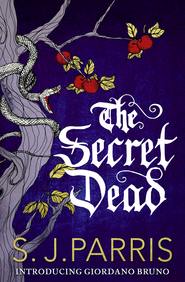По всем вопросам обращайтесь на: info@litportal.ru
(©) 2003-2024.
✖
Giordano Bruno Thriller Series Books 1-3: Heresy, Prophecy, Sacrilege
Автор
Год написания книги
2019
Настройки чтения
Размер шрифта
Высота строк
Поля
‘Perhaps he refers to the fact that I was once in holy orders, or the fact that I am no longer,’ I said, evenly.
‘Or perhaps he means something else altogether,’ Walsingham said, looking at me carefully. ‘But we will come to that. First tell me – what do you know of me, Filippo Bruno?’
I snapped my head round to stare at him then, wrong-footed – as he had intended I should be. I had abandoned my baptismal name when I entered the monastery of San Domenico Maggiore and taken my monastic name of Giordano, though I had reclaimed it briefly while I was on the run. For Walsingham to address me by it now was clearly a little trick to show me the reach of his knowledge, and he was evidently pleased with its effect. But I recovered myself, and said,
‘I know enough to see that only a fool would attempt to hide anything from a man who has never met me, yet calls me by the name my parents gave me, a name I have not used these twenty years.’
Walsingham smiled.
‘Then you know all that matters at present. And I know that you are no fool. Reckless, perhaps, but not a fool. Now, shall I tell you what else I know about you, Doctor Giordano Bruno of Nola?’
‘Please – as long as I may be permitted to separate for your honour the ignominious truth from the merely scurrilous rumour.’
‘Very well, then.’ He smiled indulgently. ‘You were born in Nola, near Naples, the son of a soldier, and you entered the monastery of San Domenico Maggiore in your teens. You abandoned the order some thirteen years later, and fled through Italy for three years, pursued by the Inquisition on suspicion of heresy. You later taught in Geneva, and in France, before attracting the patronage of King Henri III in Paris. You teach the art of memory, which many consider to be a kind of magic, and you are a passionate supporter of Copernicus’s theory that the Earth rotates around the Sun, though the idea has been declared heretical by Rome and by the Lutherans alike.’
He looked at me for confirmation, and I nodded, bemused.
‘Your honour knows much.’
He smiled.
‘There is no mystery here, Bruno – when you stopped briefly in Padua, you became friends with an English courtier named Philip Sidney, did you not? Well – he is shortly to marry my daughter, Frances.’
‘Your honour could not have found a worthier son-in-law, I am sure. I shall look forward to seeing him,’ I said, and meant it.
Walsingham nodded.
‘As a matter of curiosity – why did you abandon the monastery?’
‘I was caught reading Erasmus in the privy.’
He stared at me for a moment, then threw back his head and guffawed; a deep, rich sound, such as a bear might make if it could laugh.
‘And I had other volumes on the Forbidden Index of the Holy Office. They would have sent me before the Inquisitor, but I escaped. This is why I was excommunicated.’ I folded my hands behind my back as I walked, thinking how strange it seemed to be reliving those days in this green English garden.
He regarded me with an inscrutable expression and then shook his head as if puzzled.
‘You intrigue me greatly, Bruno. You fled Italy pursued by the Roman Inquisition for your suspected heresy, and yet you were also arrested and tried by the Calvinists in Geneva for your beliefs, is it not so?’
I tilted my head, half-assenting.
‘There was something of a misunderstanding in Geneva. I found the Calvinists had only swapped one set of blind dogma for another.’
Again he looked at me with something approaching admiration, and laughed, shaking his head.
‘I have never met another man who has managed to get himself accused of heresy by both the pope and the Calvinists. This is a singular achievement, Doctor Bruno! It makes me ask myself – what is your religion?’
There was an expectant pause while he looked at me encouragingly.
‘Your honour knows that I am no friend of Rome. I assure you that in everything my allegiance is to Her Majesty and I would be glad to offer her any service I may while I remain under her sovereignty.’
‘Yes, yes, Bruno – I thank you, but that is not an answer to my question. I asked what is your religion? In your heart, are you papist or Protestant?’
I hesitated.
‘Your honour has already pointed out that both sides have found me wanting.’
‘Are you saying that you are neither? Are you an atheist, then?’
‘Before I answer that, may I know what the consequences of my answer might be?’
He smiled then. ‘This is not an interrogation, Bruno. I only wish to understand your philosophy. Speak frankly with me, and I will speak frankly with you. This is why we are walking here among the trees, where we will not be overheard.’
‘Then I assure your honour that I am not what is usually meant by the word “atheist”,’ I said, fervently hoping that I was not condemning myself. ‘In France, and here in her embassy, I call myself a Catholic because it is simpler not to make trouble. But in truth, I do not think of myself as Catholic or Protestant – these terms are too narrow. I believe in a greater truth.’
He raised an eyebrow.
‘A greater truth than the Christian faith?’
‘An ancient truth, of which the Christian faith is one later interpretation. A truth which, if it could be properly understood in our clouded age, might enlighten men instead of perpetuating these bloody divisions.’
A pregnant silence fell. The sun was low in the sky now, and in the shade of the trees the air was growing cool. Birdsong became more insistent with the gathering dusk, and Walsingham continued to pace through the grass, the shoulders of his black doublet flecked with white petals of blossom that fluttered from the branches overhead.
‘Faith and politics are now one and the same,’ he went on. ‘Perhaps it was always so, but it seems to have reached new extremes in our troubled century, do you not think? A man’s religion tells me where his political loyalties lie, far more than his place of birth or his language. There are many stout Englishmen in this realm with a greater love for Rome than you have, Bruno, or than they have for their own queen. Yet, in the end, faith is not merely politics. Above all else it is a matter of a man’s private conscience, and how he stands before God. I have done things in God’s name that I must justify before Him at the last judgement.’ He turned and fixed me with an expression of sorrow then. When he spoke again his voice was quiet and expressionless. ‘I have stood by and watched a man’s beating heart ripped from his living body at my command. I have coldly questioned men as their limbs were pulled from their sockets on the rack, and the very noise of that is enough to bring your stomach into your mouth. I have even turned the wheels myself, when the secrets that might spill from a man’s lips as he stretched were too sensitive for the ears of professional torturers. I have seen the human body, made in the likeness of God, forced to the very limits of pain. And I have visited all these horrors and more on my fellow creatures because I believed that by doing so I was preventing greater bloodshed.’
He passed a hand across his forehead then, and resumed walking.
‘Our nation is young in the new religion, and there are many in France and Spain who, with the backing of Rome, seek to kill Her Majesty and replace her with that Devil’s bitch, Mary of Scotland.’ He shook his head. ‘I am not a cruel man, Bruno. It gives me no pleasure to inflict suffering, unlike some among my executioners.’ He shuddered, and I believed him. ‘Nor am I the Inquisition – I do not imagine myself responsible for men’s immortal souls. That I leave to those ordained to the task. I do what I do purely to ensure the safety of this realm and the queen’s person. Better to have one priest gutted before the crowds at Tyburn than he should go free to convert twenty, who might in time join others and rise up against her.’
I inclined my head in acknowledgement; he did not seem to expect debate. Beneath the largest and oldest tree in the orchard a circular bench had been constructed to fit around its trunk. Here Walsingham motioned to me to sit beside him.
‘You are a man who knows first-hand the persecutions Rome visits on her enemies. The streets of England would run with blood if Mary of Scotland found her way to the throne. Do you understand me, Bruno? But these conspiracies to put her there are like the heads of the Hydra – we cut off one and ten more grow in its place. We executed that seditious Jesuit Edmund Campion in ’81 and now the missionary priests are sailing for England by their dozens, inspired by his example of martyrdom.’ He shook his head.
‘Your honour’s task is not one I envy.’
‘It is the task God has given me, and I must look for those who will help me in it,’ he said simply. ‘Tell me, Bruno – does the French king provide for you, other than your lodgings at the embassy?’
‘He supports me rather with his good opinion than with his purse,’ I said. ‘I had hoped to supplement my small stipend with some teaching. To that end I planned to visit the famous University of Oxford, to see if they might have some use for me there.’
‘Oxford? Indeed?’ he said, a spark of interest catching in his eyes. ‘Now there is a place mired in the mud of popery. The university authorities make a show of rooting out those who still practice the old faith, but in truth half the senior men there are secret papists. The Earl of Leicester, who is its chancellor, makes endless visitations and orders enquiries, but they scurry away like spiders under stones as soon as he shines a light on them. Then, once our backs are turned, they go on filling the heads of England’s young men with their idolatry – the very young men who will go on to the law and the church, and into public life. Our future government and clergy, no less, being turned secretly to Rome under our very noses. Her Majesty is furious and I have told Leicester it must be addressed with more vigour.’ He pressed his lips together, as if to suggest things would not be so lax if he were in charge. ‘The place has become a sanctuary for those who trade in seditious books, and most of these missionary priests coming out of the French seminaries are Oxford men, you know.’ Then he thought for a moment, and moderated his tone. ‘Yes, you should go to Oxford. In fact, I shall be glad to recommend you if you wish to visit. There is much you might see of interest.’
He paused as if contemplating some idea, then his thoughts appeared to land briskly elsewhere.
‘When you told me you wished to serve Her Majesty in any way she saw fit to use you – was this offer sincere?’
‘I would not make such an offer in jest, your honour.’
‘Her Majesty has money in her treasury for those willing to be employed under my authority, to aid in protecting her person and her realm from her enemies. And she would show her gratitude by other means as well – I know how important patronage and preferment can be to you writers. This would be the greatest service you could perform for her, Bruno – living at the French embassy, you will be privy to a great many clandestine conversations, and anything you hear touching plots against Her Majesty or her government, anything that concerns the Scottish queen and her French conspirators’ – he spread his arms wide – ‘letters you may glimpse, anything that you think may be of interest, no matter how small, would be of great value to us.’





